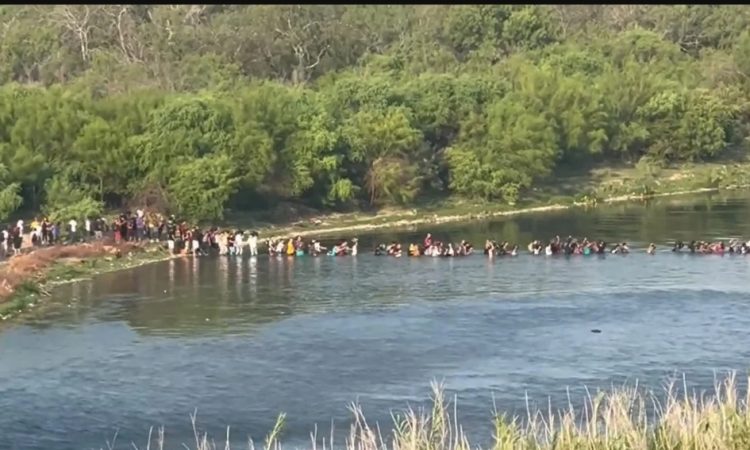Catholic NGOs Receive Billions in Government Funding to Provide Illegals Housing, Food, Healthcare, Financial Assistance and More

America, Land of the Free—Freebies for illegals
Guest post by Elizabeth Yore
The numbers of illegals crossing over the southern border into America are staggering. In the second year of the Biden Administration, FY 2022, (ending Sept. 30, 2022) 2.7 million illegals crossed into the U.S. according to Customs and Border Patrol. (In just 12 months, that equals the population of Chicago).
Since September, the numbers are soaring with each passing month. In the months of October and November 2022, the illegal crossings clicked up to 412,000 illegal migrant encounters. This startling statistic does not include the massive 150,000 “got aways” that eluded detection during those 2 months.
Since the start of the Biden Administration, over 5.5 million have crossed illegally into the southern U.S. border. That staggering number does not include the estimated over 1 million “got aways” during the last 24 months. (For comparison, that amounts to the combined population of Chicago and Los Angeles in 24 months).
Who is promising them the pot of gold on the other side of the Rio Grande? What are the welfare benefits awaiting the staggering number of illegals?.
How does a country absorb millions of illegals from over 106 countries in 24 months? How quickly will the U.S. social services, education, criminal justice, health care, employment and housing systems collapse under the weight of this global invasion?
Behind these jaw dropping numbers lurks a vast network of NGOs which facilitate the influx of illegals into the U.S.
Catholic NGOs are amongst the largest recipients of immigration-related federal grants:
Between 2008-2021, Catholic NGOs received over $3.1 BILLION in federal funding, an average of over $223 MILLION annually;
In 2022 under the Biden Administration, the annual awards to Catholic NGOs skyrocketed to $599 MILLION, nearly a three-fold increase;
Over $97 MILLION of the 2022 funding was devoted related to the “Unaccompanied Alien Children Program.”
The largest Catholic NGO involved in immigration activities is Catholic Charities. Their website on immigration services details a breakdown of the multitude of benefits and handouts provided to illegal immigrants as soon as they cross over illegally into the United States. These handouts are funneled through federal grants which are funded by the hard-earned money of American taxpayers.
It’s urgent that the American taxpayer pays attention. Check out the open checkbook and streets paved with gold straight from the El Paso Catholic Charities website:
“Catholic Charities also assists refugees, immigrants (documented or not) and asylum seekers with legal, basic needs, and settling.”
“Anyone that is struggling with their rent, immigrants or migrant workers from Mexico, and others that are homeless, can apply to transitional housing or homeless shelters. This Catholic Charities service gives support to people who were recently evicted or that have some other barrier, such as maybe a disability or they are a senior on a fixed income.”
Many of the Catholic Charity clients to these temporary housing resources are people who have been in and out of the local shelters numerous times. Others are facing a one time crisis, such as a job loss. The El Paso TX Catholic Charities will try to help clients become stabilized. Then, once that has been done, the next step is to locate new permanent apartments in the community and learn to access and use other local relevant providers.”
Wait, More perks lurk….:
“Case Management and help for immigrants, migrants and asylum seekers”
“Catholic Charities, both in El Paso County Texas as well as nationwide, assists those people, no matter their race, religion, or backgrounds, that have moved to the El Paso area. There is support for refugees, immigrants, Spanish speakers, and others from out of state or the country, including from across the border. The non-profit can help people find, and pay for, county Identification Cards. This can be a driver’s license, birth certificate, or social security card among others.”
“Immigrants, migrants and asylum seekers can get assistance. There is free or low cost legal aid. Get help with acclimating to the region, such as ESL Classes or assistance in locating basic needs, including food or housing as well as hygiene items. Catholic Charities will help migrants / immigrants with trying to get Green Cards, the naturalization process, and navigating the complex process on citizenship.
“Financial aid can be used for El Paso County Identification cards. These are critical for newcomers. As proper ID is essential for obtaining any type of government benefit or employment. As far as the legal support, this is generally low cost.” Read more on resources for immigrants.”
Hold on, even more freebies await the lawbreakers…:
“Assistance for undocumented
“Undocumented immigrants, as well as those that area legally in this country, can get assistance for their needs as well. There are states that can provide government benefits as well as several charities that offer help in an emergency. Everything from housing placement to free food for undocumented immigrants or migrants, financial assistance for paying bills, employment opportunities, legal protections, cash aid, and other support may be given to immigrants as noted below.”
“Services are often provided in many languages as well. Immigrants that speak Spanish, Mandarin, Vietnamese, or any other number of languages can apply for assistance.
There is also help provided for undocumented children who tend to be most vulnerable without some form of support. Another focus is on protecting senior citizens as well as the elderly. The primary resources, as well as agencies for legal or undocumented or illegal immigrants to contact are below. Each of them focuses on different needs.”
Not done yet, more goodies:
“Housing programs available for immigrants”
“As noted, some assistance is generally available, especially for housing, rent, food, medical care, and critical needs. However there are no guarantees to getting help, in particular for immigrants with no documentation or identification. Many of the resources for undocumented immigrants are also very regional, as some states (as well as non-profits that operate in them) are more accommodating than others.”
“Rent as well as housing assistance is not mandated by the government. However there are many charities that offer solutions. As at the end of the day no organizations want an undocumented immigrant, or one who is in the process of applying for citizenship, to be homeless. This does not do society any good.”
“There are a few options available. The first will be financial aid that can help with rental payments. This solution tends to be if the immigrant has some form of employment and is more stable. Everything from homeless prevention to cash grants may be offered.”
“Illegal, or undocumented immigrants, without any form of stability may be better served by short term, emergency housing such as shelter or transitional units. Even these programs will tend to be more restricted, as groups such as the Salvation Army will limit who or who can’t use them. But they may be an option. Find more details on transitional housing programs.”
“If the shelters are full, then vouchers can be given to pay for a motel or even hotel room. This is a government benefit for undocumented immigrants, especially those with children, that is more common in some states. It will only pay for a limited amount of time; normally a night or two. Locate motel voucher assistance programs.”
Hold on, still more benefits…:
“Free or low-cost food, meals, and hunger prevention”
“One benefit that undocumented immigrants are entitled too is food as well as general hunger prevention. The federal government in fact requires states to offer this solution to migrant farm workers, immigrants, and even refugees. There are a few different options available.”
“For ongoing, long term support, SNAP food stamps are available. This assistance program will help the immigrant afford the groceries they need on a monthly basis. An EBT debit card will be issued to them which can be used at a grocery store.”
“As noted, children (especially newborns as well as babies) are a focus. Illegal immigrants with new babies, or even pregnant women, can apply for the Women, Infants and Children (WIC) program. This provides a free voucher to use for buying formula or other critical food items for the mom (or pregnant woman). The government also provides general nutritional counseling to undocumented as well as legal immigrants. Read more on WIC benefits.”
“Undocumented children under the age of 5 can get free meals and/or food if they enroll into Head Start. The federal government funded benefit even provides educational support at the same time. While the kid is at school, they can eat, be given breakfast and/or a free lunch, learn about K-12 education, and learn. The assistance program therefore has many benefits for undocumented immigrants, and find more information on the Head Start benefit.”
The goody list is never ending….:
“Health care for undocumented immigrants”
“The first option in Emergency Medicaid. Both the federal government as well as states contribute to this benefit. It is legally required to be offered to all people in this country, whether they are legal or not. So an immigrant can have a portion of their medical bills paid, by given lost cost prescription drugs, and other health care. Call a local social or human service office for this form of support.”
“Illegal immigrants often turn to sliding fee or free community clinics for their medical care as well. These are located in rural communities, cities, and really most towns and counties. Most of them are set up at charity organizations and are operated by volunteers. Some doctors offer care or a dentist may even provide free checkups or tooth cleaning to undocumented immigrants, including children or the elderly. There are both dental clinics as well as those that focus on other services, including clinics for medical care.”
“States often offer health care for the uninsured as well. In some parts of the country this will cover immigrants that are not documented. But some state benefits may not be as flexible. However these uninsured assistance programs are another possible way to get free or discounted medical care.”
Hang on, there’s still a pot of gold at the end of the rainbow….:
“Immigrant financial assistance programs”
“This form of support is more difficult to get. Some charities or churches may assist, but each organization will have their own application processes for cash assistance or housing programs for undocumented immigrants as well as funding levels. Grant based programs may require proof of identification or residency, which an undocumented immigrant may not be able to receive. There may also be some loans available that are based on the immigrants’ weekly paycheck or income.”
“No matter the immigrant’s religion, rage, or nationality, a church is often very willing to help. They often collect tithes from their members, or they receive donated goods from the community. This allows the parish to offer everything from a box of food to a few dollars to pay for housing, gasoline, or offer clothing. Find a listing of financial assistance programs from churches.”
“Many national charities also offer free financial help to immigrants, both legal or illegal. There are dozens to try, ranging from the Salvation Army to Catholic Charities, United Way and others. Each will focus on assisting with a certain type of bill. Everything from emergency housing to food, bus vouchers, or free clothing for work may be given to undocumented workers. Other aid may also be arranged, and locate charities that help pay bills both at the local as well as national level.”
“Undocumented immigrants can also receive money from low interest rate or even payday loans. However, this should really be a last resort. As the risk to an illegal immigrant in borrowing money to pay for monthly bills is very high. Using some form of loan can put the individual on a path to financial hardship, but it is an option.”
“Immigrants will also need to eventually build credit as well. This can sometimes be a challenge when entering the United States, but there is assistance available as well as steps to take to start the process to establish a financial history. Find how immigrants can start to build credit.”
“Many immigrants, whether undocumented or legal, do not have checking or saving accounts; they are unbanked. They also may tend to send money “home” or overseas to help support their families. Prepaid cards can help them write checks, save money, build credit, and have other advantages. Find prepaid cards for the unbanked.
“Immigrants can also get help in transferring their money overseas. Many have family they support if and when possible. There are smartphone apps that are free to use (or have very low fees) for sending funds, whether from a job or some other source, to foreign countries. Find the leading apps for sending money overseas.”
“As noted some state governments offer their own cash assistance or benefits to undocumented immigrants. This is generally done at the local level as most federal government programs, including TANF welfare, do not assist immigrants. Therefore the state may step in to offer financial help, whether it is a disability resource, information on employment opportunities, or other support. Find more details on assistance from the government.”
“When deportation occurs, or an illegal immigrant is threatened by it, then a free lawyer consultation may be useful. The police may arrest an undocumented immigrant. Or there may also be “raids” by the Department of Homeland Security (DHS) or some other federal government organization. If/when this occurs, and the U.S. Immigration and Customs Enforcement agency becomes involved, an immigrant can seek free legal aid from charities or even volunteer lawyers. There are resources to ensure legal rights are protected from the U.S. Immigration and Customs Enforcement (ICE) or other related government groups.”




